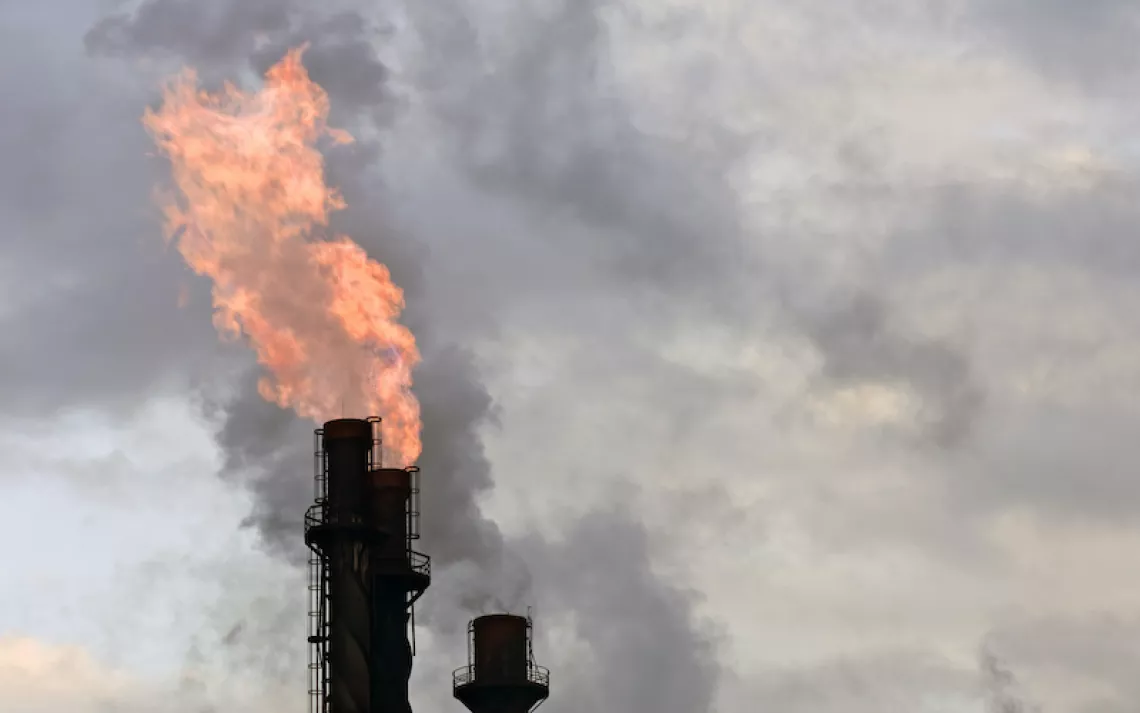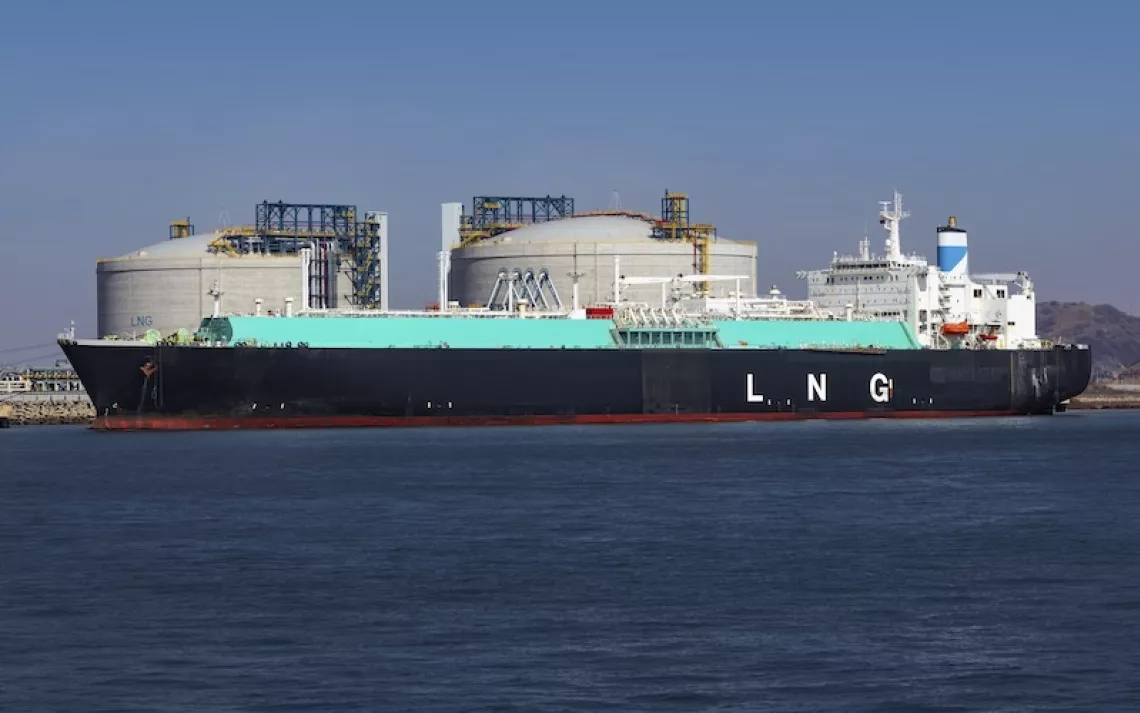Biden Administration Restricts Lending for Overseas Fossil Fuel Projects
The US Department of Treasury’s new rules restrict oil and coal financing but leave the door open for gas projects

Dominion Energy's Cove Point LNG Terminal in Lusby, Maryland, on June 12, 2014. | Photo by AP Photo/Cliff Owen
Earlier this week, the Biden administration announced that it would end overseas financing of new oil and coal projects through multilateral development banks such as the Word Bank, a policy move aimed at shifting global capital away from fossil fuels at a time when the climate crisis is deepening. While the policy does allow for the continued financing of some overseas gas projects, it is likely to accelerate the transition to renewable energy by cutting off the investment pipeline for the least necessary fossil fuel projects.
The United States plays an influential role in multilateral development banks (also known as MDBs) as well as regional development banks such as the African Development Bank, the Inter-American Development Bank, and the Asian Development Bank. As the largest shareholder in these institutions, the United States holds major sway over their lending policies.
The banks have long promoted fossil fuel projects under the guise of economic development, and financing typically occurs when private-sector lenders deem an oil or gas project to be too risky or when private financing is insufficient and low-income countries need help bridging the gap. In this way, MDBs help extend and expand the fossil fuel economy.
Last year alone, in the midst of the pandemic, MDBs financed $3 billion in fossil fuel projects.
But under growing pressure from investors, climate-wise governments, and environmental groups, lending policies at the MDBs are changing as scrutiny on the oil, gas, and coal industries increases. Last year, the United Kingdom announced an end to overseas lending for fossil fuel projects.
The new policy announced by the Biden administration on August 16 marks a notable shift in US overseas lending and climate diplomacy. By partially cutting off the gusher of money that flows into dirty projects, the policy adds some teeth to an executive order President Biden signed on his first few days in office. The announcement also follows a July meeting that Treasury Secretary Janet Yellen convened with the heads of the top MDBs, during which participants discussed ways the banks could “redouble their efforts to mobilize significantly more private capital for climate.”
“Developing countries and communities everywhere deserve to have their voices heard and to have access to the cleanest, safest, and cheapest energy sources available, including wind, solar, and energy efficiency,” the Sierra Club’s international climate and policy associate director Neha Mathew-Shah said in a statement following the Treasury Department’s announcement. “Today’s guidance is an important step toward ensuring that these communities are no longer forced to pay the price with their health or their wallets for these polluting projects.”
Under the new lending guidance issued by the Department of Treasury, the Biden administration will oppose all new coal and oil projects. There are some minor exceptions. For coal, financing will be considered only for decommissioning existing coal plants; and for oil, there is some leeway for oil-based power generation when it is needed for backup or emergency uses and if no renewable alternative is feasible. But overall, the policy is relatively strict.
When it comes to natural gas, however, the Biden administration stopped far short of a ban on new financing. The US government will oppose overseas financing for gas drilling but said it would support pipelines, power plants, and other downstream uses if the proposed project met four specific criteria. The banks would make exceptions for a gas project in low-income countries where no clean alternative is feasible, as long as the gas project supports some development or energy security objectives, and as long as it is still in alignment with the Paris Agreement and avoids locking countries onto a polluting pathway.
Critics said the language left too much wiggle room. “The Treasury guidance leaves loopholes for continued fossil fuel financing that are so big, you can drive an LNG ship through them,” Luisa Galvao, international policy campaigner with Friends of the Earth, said in a statement.
“I'm honestly pretty disappointed by this guidance,” Galvao told Sierra. “I'm concerned by the lack of detail on the gas restrictions.” She said that while the coal and oil restrictions were very encouraging, the position on gas is much more important because 75 percent of overseas lending through MDBs these days is funneled to gas projects. Oil receives much less, and the spigot for coal financing has already been mostly turned off.
On Wednesday, a group of 37 grassroots environmental organizations from 17 nations in Africa, Asia, and Latin America sent a letter to Treasury Secretary Yellen echoing some of those concerns and calling for the new policy to be further strengthened. The signatories called on the US government to “oppose all new fossil fuel projects, across the oil, gas, and coal value chain” and to “support a just transition away from fossil energy and to community-centered renewable energy for workers and communities, with improved consultation at country level.”
One of the key criticisms of the new policy is that the Treasury Department said gas projects could receive financing in instances where there is not a renewable alternative, but the agency did not offer any additional detail on how it might conduct a so-called alternatives assessment that would make the determination that a solar project, for example, was unviable.
“It could very well become a rubberstamping exercise where they say they did an alternatives assessment, it passed, and the fossil fuel project goes forward,” Galvao said. If it becomes just another box to check, “then this guidance unfortunately is going to be supporting a lot of business as usual,” she said.
Liquefied natural gas (LNG) export projects may still pass muster under this new guidance, which is out of step with what experts say is necessary to address climate change. Earlier this year, the International Energy Agency, which has historically been allied with the oil and gas industry, urged the world to accelerate its efforts, stating that “no new oil and natural gas fields are needed” if the world is to achieve net-zero emissions by mid-century. And just last week the Intergovernmental Panel on Climate Change published its latest authoritative report on climate science, emphatically warning that climate disasters will increase in frequency and severity unless greenhouse gas emissions are rapidly ratcheted down.
Galvao pointed to the deeply problematic $20 billion LNG project in Mozambique pursued by French oil giant TotalEnergies and a consortium of global energy companies as an example of a fossil fuel project MDBs are helping to push forward. The project would facilitate the expansion of gas drilling in Mozambique and allow that gas to be exported to Asia.
In July 2020, the African Development Bank approved a $400 million loan in direct financing for the project. The World Bank helped in a more indirect way by providing financing for technical assistance—money that went to the government of Mozambique to hire advisers for the project—and also for policy changes that enabled a favorable landscape for the multinationals to come into the country. Notably, the World Bank had previously ruled out financing overseas oil and gas projects, but it still provides money for “technical assistance,” which can ultimately end up aiding fossil fuels.
Taken together, the MDB financing helped make the Mozambique gas project the largest foreign direct investment in Africa’s history. But in early 2021, TotalEnergies suspended the LNG project and evacuated its staff from Mozambique due to a worsening multiyear insurgency in the country.
Galvao said that if the US Treasury’s new lending guidance had been in place previously, it is possible that the MDBs would have rejected financing for TotalEnergies’ LNG project. But, she warned, because the new policy is still so vague, it’s hard to say. “This is where we’re concerned because we don’t have any details,” she said.
If the standards laid out in the Treasury Department’s guidance are loosely applied, it could enable 40 percent of the financing for fossil fuel projects issued between 2018 and 2020 by MDBs to continue, according to an analysis by Oil Change International.
“That’s $1.6 billion per year for gas pipelines, power plants, and LNG terminals that the climate and frontline communities can’t afford,” Bronwen Tucker, research analyst at Oil Change International, said in a statement.
Despite the shortcomings, the new restrictions on lending by multilateral development banks are part of a growing wave of global finance turning against fossil fuels. In 2020, MDBs issued four times as much lending for clean energy projects as the amount for fossil fuels. The new guidance issued this week shows that the smart money—including lending influenced by the US Treasury—is making a swift retreat away from the fossil fuel investments of the past.
This article has been updated since publication.
 The Magazine of The Sierra Club
The Magazine of The Sierra Club



